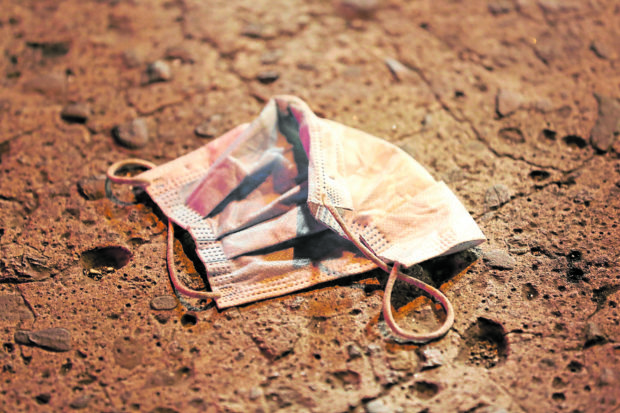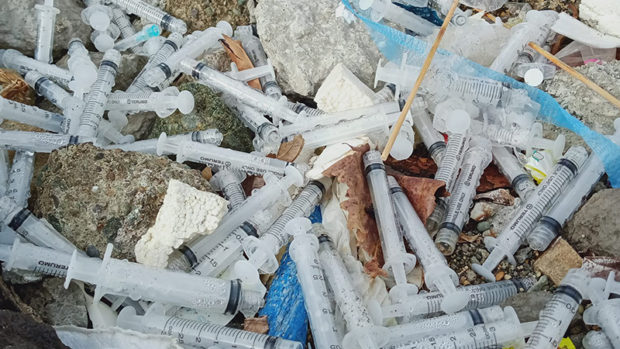DENR collects 1,000 metric tons of medical waste per day, equivalent to 166 trucks

FILE DISCARDED FACE MASK A face mask lies discarded along South Avenue in Makati City.
INQUIRER PHOTO / NIÑO JESUS ORBETA
MANILA, Philippines — One thousand metric tons of healthcare wastes are being collected per day in the country amid the COVID-19 pandemic, an official of the Department of Environment and Natural Resources (DENR) said on Thursday.
DENR Undersecretary Jonas Leones noted that since the government mandated the use of face masks, COVID-19 wastes have spiked.
“Nabigla rin tayo dahil nung minandatory natin ‘yung paggamit ng face mask, talagang dumami ‘yung mga COVID-related waste natin… Sa ngayon, ang taya ng ating Environmental Management Bureau, mayroon tayong 1,000 metriko toneladang healthcare waste kada araw ang kinokolekta natin. So, napakarami niyan,” he said during the Laging Handa briefing.
(We were also shocked because since the government’s face mask mandate, COVID-related waste grew. Now, our Environmental Management Bureau has collected 1,000 metric tons of healthcare waste per day. That is a lot.)
“So, ibig sabihin niyan, kung six-tonner ‘yung ating truck, 166 na truck ang lumalabas kada araw para kolektahin itong mga waste na ‘to,” he added.
(This means that if trucks could carry six tons, we will need to deploy 166 trucks per day to collect these wastes.)
Leones shared that they are coordinating with local government units, especially barangays, to ensure the collection of wastes.
“So, kinakailangan natin strict implementation natin ng Solid Waste Management Act, ‘yung segregation and collection,” he stressed.
(So, we need a strict implementation of the Solid Waste Management Act, segregation, and collection.)
Leones explained that a barangay collects the healthcare wastes and transports them to a temporary transfer station. The municipal government then gets the waste and brings it to the treatment facility before it is directed to the final disposal site.
The final disposal site would either be the landfill or the storage area in treatment facilities.
“Ang ginagawa natin ang barangay sila ‘yung kumukolekta at nilalagay muna ‘yan sa temporary transfer station at du’n kinukuha ng ating munisipyo ‘yung mga healthcare waste na ito para dalhin sa treatment facility para i-treat bago siya dahil sa final disposal site natin, either du’n sa landfill or du’n sa treatment facility na mayroon din silang mga storage facility du’n,” explained Leones.
(What we do is that we designate the barangays to collect these wastes and put them in transfer stations, and then are collected to be brought to treatment facilities before final disposal in landfills or in storage facilities.”)
In January, seven kids were reported to have contracted COVID-19 after playing with medical waste in Catanduanes.

HEALTH HAZARD Hundreds of medical waste, such as syringes and blood sample tubes, are dumped at the shoreline of Barangay Concepcion in Virac, Catanduanes, on Jan. 24 and are believed to be cause of the COVID-19 infection of seven children who played with them. —PHOTO COURTESY OF ANTHONY ARCILLA
The Department of Health warned hospitals and local governments to mind their waste as they are “not going to tolerate this kind of irresponsible behavior because it can cause harm to other citizens.”
EDV
For more news about the novel coronavirus click here.
What you need to know about Coronavirus.
For more information on COVID-19, call the DOH Hotline: (02) 86517800 local 1149/1150.
The Inquirer Foundation supports our healthcare frontliners and is still accepting cash donations to be deposited at Banco de Oro (BDO) current account #007960018860 or donate through PayMaya using this link.